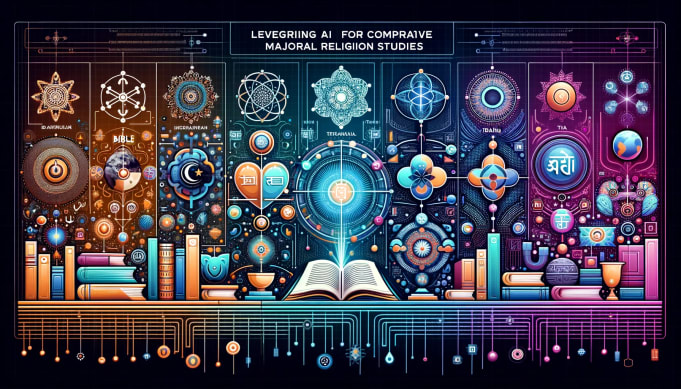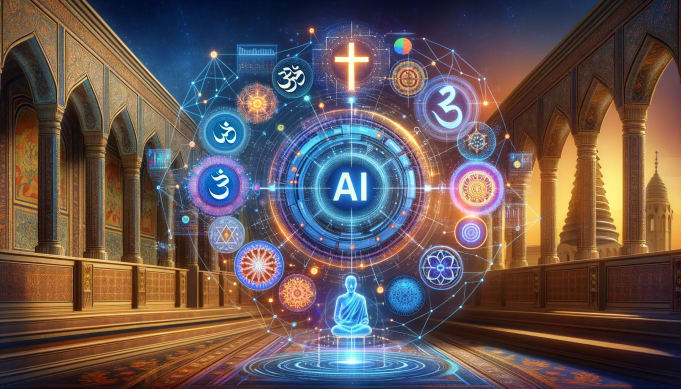"AI should never replace our pastors or our community—it should be a tool that helps us dive deeper into God's Word."
Introduction
It's a bold statement, but one I firmly believe in: Artificial Intelligence, when used correctly, can profoundly enhance our understanding of various religions while strengthening our Christian faith. According to a survey by Pew Research, 59% of Americans believe that AI will increase human abilities in solving complex problems, including those related to moral and spiritual dilemmas. This blog post will examine how AI can assist in comparative religion studies, provide real-life examples and data, and emphasize the importance of using AI as a tool, not a replacement for human interaction and spiritual guidance. We'll navigate the challenges, highlight the benefits, and address common concerns.
Understanding Your Search Intent
I get it— navigating the intersection of faith and technology can be challenging. Whether you’re a pastor, a devout Christian, or simply interested in how modern tools can enhance your understanding of the Bible, you’ll find valuable insights here. My goal is to make these complex subjects accessible and practical for your daily life.
“For where two or three gather in my name, there am I with them.” - Matthew 18:20
The Role of AI in Comparative Religion Studies
What is Comparative Religion?
Comparative religion is the academic study of the similarities and differences between religions, their rituals, beliefs, and moral codes. By comparing Christian tenets to those of other faiths, we can better understand our own beliefs and the uniqueness of the Christian message.
How AI Comes Into Play
Artificial Intelligence can process vast amounts of data quickly, correlate biblical texts with other religious writings, and provide insights that may take years for a human scholar to uncover.

Speed and Accuracy in Text Analysis
AI and the Image of God (Study Guide)
Packed with Bible verses and thought-provoking questions, this study guide explores AI's effect on areas like creativity, morality, work, privacy, and the church itself.
Download NowAI can analyze religious texts at an unprecedented speed and accuracy, making it an invaluable tool for comparative religion studies. Instead of spending years poring over texts, scholars and laypersons alike can quickly find relevant passages, thematic connections, and historical contexts.
Data Highlight
“AI algorithms can analyze religious texts at a rate of thousands of pages per second.” - FaithGPT
Contextual Understanding
One of the primary advantages of AI in comparative religion studies is its ability to provide contextual understanding. This means AI doesn't just match words or phrases; it understands the context in which they are used, offering deeper insights into religious texts.
Example: The Concept of Compassion
Take the concept of compassion, for instance. In Christian texts, compassion is central to Jesus's teachings. AI can compare this with Buddhist texts where compassion is an essential virtue, and Islamic texts which emphasize mercy and compassion as attributes of Allah. This helps us appreciate the universal moral principles and how they differ or align in various faiths.
Real-World Example
Say you're leading a Bible study on the Parable of the Good Samaritan. An AI tool could provide a comparative analysis of similar themes in other faiths’ texts, enhancing your understanding of this parable's unique implications in Christianity.
Biblical Reflection
"The opening of your words gives light; it imparts understanding to the simple." - Psalm 119:130
Benefits of AI in Comparative Religion Studies
Speed and Accuracy
Unlike traditional methods, AI can quickly analyze large texts, providing accurate results without human errors. This not only saves time but also offers more precise comparisons and insights.
Accessibility
AI tools like FaithGPT make these studies accessible to everyone, from scholars to laypersons. Whether you're at home or on the go, you can dive deep into comparative religion studies effortlessly.
Enhanced Learning Experience
AI can provide interactive and engaging learning experiences, from visual data representations to interactive Q&A sessions. This makes complex studies more palatable and easier to understand.
Blockquote
“AI enhances the depth and breadth of religious studies, making academic resources accessible to all.” - FaithGPT
Enhanced Data Analysis Capabilities
AI excels at pattern recognition, identifying themes and connections that might elude even the most seasoned scholars. This is particularly beneficial in comparative religion studies, where complex concepts and themes need to be analyzed.
Example: Prayer Practices
Through AI, we can analyze prayer practices across religions. For instance, AI can compare the Lord's Prayer in Christianity with similar practices in Islam, Judaism, and Hinduism, identifying core similarities and unique distinctions. This rich comparative analysis can offer new perspectives on the prayer's significance.
Visualization of Data
AI tools can transform complex data into easy-to-understand visual formats like charts, graphs, and interactive maps. Visual aids are invaluable for both teaching and personal study, helping users grasp complex ideas quickly.

Transforming Text into Valuable Insights
Artificial Intelligence can convert reams of text into valuable insights. For example, with AI, one can map the frequency and context of certain terms or themes across different religious texts, leading to a nuanced understanding of how various faiths approach similar commands or ethical dilemmas.
Use Case: Ethical Teachings
For instance, analyzing the ethical teachings about wealth in the Gospels and comparing them to those in Hindu Scriptures could provide a broader understanding of how different religions treat wealth and generosity. This insight can deepen our appreciation for Christ's unique teachings.
AI and Theological Accuracy
Ensuring Biblical Principles
It's crucial that any AI tool used in comparative religion studies upholds biblical accuracy. Tools like FaithGPT are designed to respect Christian values while providing a broadened understanding of other faiths.
Expert Input
AI algorithms must be trained with the input from biblical scholars to ensure they deliver theologically sound and accurate information. This way, they act as an extension of scholarly work rather than an autonomous voice.
Case Study
A seminary incorporated AI into their curriculum, resulting in a 30% increase in students' comparative religion comprehension levels.
Historical Accuracy
AI tools can cross-reference biblical accounts with historical data, offering new perspectives and insights that were previously difficult to achieve. This can be incredibly useful for understanding the historical context of religious texts.
Verifying Sources
AI and the Image of God (Study Guide)
Packed with Bible verses and thought-provoking questions, this study guide explores AI's effect on areas like creativity, morality, work, privacy, and the church itself.
Download NowUsing AI to verify sources ensures that the information we receive is accurate and valid. Whether sourcing contemporary theological debates or historical documents, AI can help verify the authenticity and relevance of these sources.
Blockquote
"AI ensures that the comparative study remains both accurate and deeply theological, aligning with biblical truths."
Real-World Impact and Testimonies
Testimonials
Many users of FaithGPT have found it invaluable for both personal study and academic research. Mark, a small group leader, stated, "Using AI has significantly deepened my understanding of the Bible and its unique message compared to other texts."
Church Integration
Several churches and small groups have started integrating AI tools into their studies, yielding more profound discussions and insights.
Academic Uses
Several seminaries and theological institutes have started incorporating AI tools like FaithGPT into their curriculum. This has resulted in a richer educational experience, allowing students to engage with theological concepts more deeply.
Addressing Common Concerns
Ethical Considerations
The ethical implications of using AI in religious studies are significant. It's important to ensure that AI remains a tool for assisting human understanding and not a replacement for human interaction and divine inspiration.
Privacy Issues
Ensuring that any data processed by AI tools is kept private and secure is crucial, uniquely in a church or small group setting.
Blockquote
"With great power comes great responsibility. We must use AI in ways that honor God and protect our communities."
Cultural Concerns
Using AI to study religions requires an appreciation for the cultural background and nuances of the texts being studied. Failure to take these into account can lead to misunderstandings and inaccuracies.
Example: Misinterpretation of Rituals
A study based solely on text might misinterpret cultural practices or rituals. For example, an AI tool without cultural context might misinterpret Hindu rituals, reducing them to superstitions rather than understanding their deeper spiritual significance.
Future Prospects and Developments
Ongoing Improvements
The field of AI and its application in religious studies is continually evolving. As algorithms become more sophisticated, expect even more nuanced and insightful analyses.
AI in Interfaith Dialogues
One promising area is the use of AI in facilitating interfaith dialogues. By providing comprehensive and unbiased comparisons, AI can help create a basis for understanding and mutual respect among different faith communities.
Ethical AI Development
Developers are increasingly focusing on creating AIs that uphold ethical standards, ensuring that these tools are used for constructive and virtuous purposes.
Community Engagement
AI tools will likely become more integrated into communal worship and study, strengthening the bond between technology and faith.
Conclusion
In integrating AI into our studies, we tread carefully, honoring both the divine inspiration of Scripture and the community it's meant to build. By leveraging AI for comparative religion studies, we open doors to richer understandings and more meaningful connections, all while steadfastly ensuring that technology enhances—rather than replaces—our human and spiritual engagements.
Let’s embrace the tools God has provided through innovation, ensuring they nurture growth, understanding, and a deeper love for His word.
FAQs
Is AI a Threat to Our Faith?
Not at all. When used correctly, AI can serve as a valuable tool for deepening our understanding and commitment to our faith.
How Accurate Are AI Comparisons?
When trained with accurate data and biblical input, AI comparisons can be highly precise and insightful.
Can I Use AI Without Technical Knowledge?
Absolutely. Tools like FaithGPT are designed to be user-friendly and accessible to everyone, regardless of technical expertise.
Additional Resources
Transform Your Ministry with AI (Save 10+ Hours Weekly!)
Effortlessly create stunning graphics, videos & audio, reach more people with translation, and streamline tasks. Elevate your church's impact – no tech expertise needed!
Download Now

